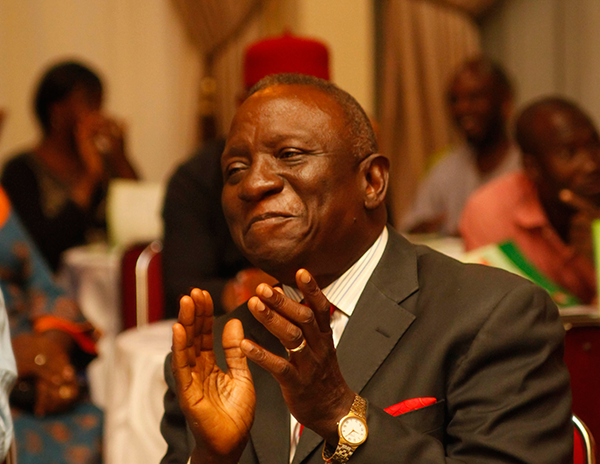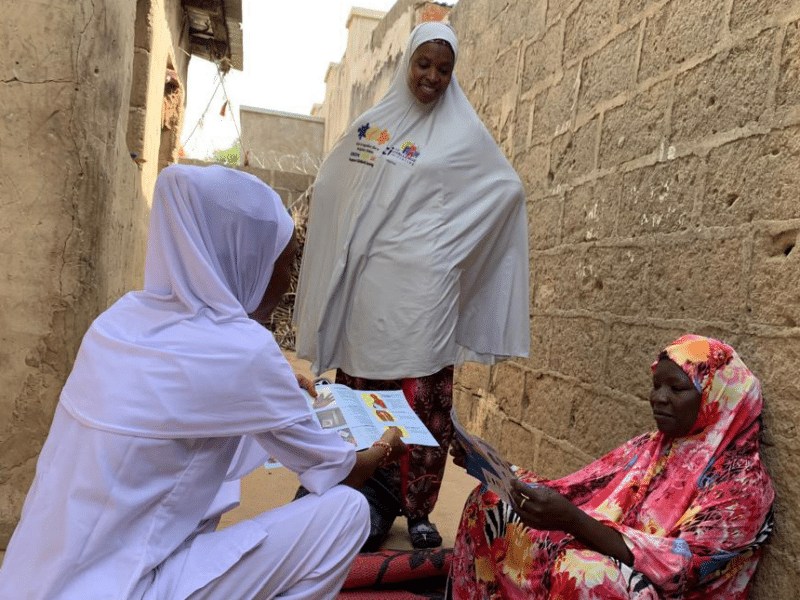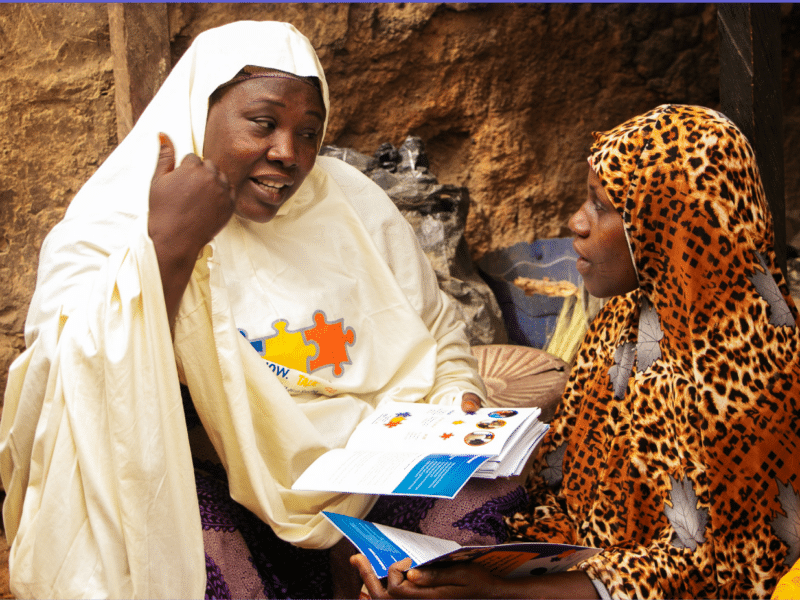As the world grows smaller, vigilance against epidemics and emerging diseases is more crucial than ever. Much of the responsibility falls on laboratory scientists, who must continually hone their skills and knowledge in the battle against Ebola, malaria, TB and other deadly illnesses.
In Nigeria, ensuring that laboratory scientists stay up-to-date in their discipline calls for a high-tech cooperative effort. In 2011, with funding support from USAID/Nigeria, the Knowledge for Health (K4Health) Project at Johns Hopkins Center for Communications Program, the Medical Laboratory Science Council of Nigeria (MLSCN), and the Association of Medical Laboratory Scientists of Nigeria (AMLSN) partnered to revitalize the country’s Continuing Professional Development (CPD) Policy and create an e-learning platform that allows lab scientists across the country to stay on top of their field while meeting licensing standards.
Godwin Ihimekpen and Daniel Adedigba exemplify AMLSN’s commitment to the field and to the health of Nigerians.
Godwin Ihimekpen
Godwin Ihimekpen had retired as a teacher and administrator when he was asked to become AMLSN’s project coordinator.
He had nearly four decades of medical laboratory experience in the United Kingdom and Nigeria during which he served as Principal of the Federal School of Medical Laboratory Science. Godwin then took an administrative position with the Federal Ministry of Health where he helped to establish Nigeria’s National Blood Transfusion Service.
Why return to work after such a long and productive career? Perhaps it was because of his lengthy resume, that he said yes. “I still believed that I could be of some service,” says Godwin, who joined the AMLSN Secretariat in early 2014.
He arrived at a dynamic time in the history of the 50-year-old AMSLN. Preparations to become financially independent from CCP when funding expires, rapid technological change and the evolving threat of deadly diseases presented him and the organization with multiple challenges.
Godwin has met those challenges with relish. Under his watch, accredited e-learning courses continue to expand to meet pressing health care needs. Godwin also wants to create hands-on training opportunities for other health professional groups that will bring in income necessary to support the organization. Down the road, he’d also like to provide training opportunities for entry-level laboratory technicians and assistants.
Looking ahead, Godwin sees continued growth and opportunities for AMLSN and its estimated 20,000 members. “In the next 50 years, I see substantial advancement in terms of professional service to our members.” For that to happen, members, themselves, will also “have to embrace change,” Godwin says. “Otherwise the world would pass them by.”
AMLSN, as well, must rise to the occasion by maintaining high professional standards for its members, who are responsible for diagnosing HIV, TB, malaria and other diseases that can decimate a country if unchecked, Godwin says. “The welfare of our country” is at stake.”
Daniel Adedigba
When AMLSN members send requests for IT assistance in the middle of the night, they are often surprised by an instant response. But that’s Daniel Adedigba, for you. He’s a one-man help desk, accessible 24/7 through multiple social media and mobile devices.
Daniel is AMLSN’s Communication Officer, a position that he quickly expanded to include IT problem solving for the organization. “Some people are surprised when you respond to them immediately,” he says. “They think, ‘This guy’s not sleeping.’”
But Daniel doesn’t see his job in 8am-to-5pm terms. “Scientists are very busy. They work all day and may only have time late at night or very early in the morning to take the e-courses.” Problems vary. They may not have access to the online courses, there could be a bug in the script or a setting needs repair, he says. “And if I’m not able to help them when they need assistance, they might not be able to come back to it,” Daniel says.
Teaching comes readily for Daniel, who has a master’s degree in human kinetics and health education. As a volunteer for the NGO Lifebuilders Nigeria, “I gave health talks once a week to the junior and senior classes about reproductive health.” Before coming to AMLSN, Daniel was part of the media monitoring and communication team at the Nigerian Urban Reproductive Health Initiative (NURHI).
Typically, 20 to 25 to 30 requests a day come to the AMLSN helpdesk. “I could be talking to about 25 people at once and helping them in different ways,” says Daniel, who is from Ibadan, a city in the country’s southwest. A phone consultation can be brief or it can take an hour, “depending on the level of knowledge of the person you’re trying to help.” He must often reassure more uncertain callers that he will stay on the line as they navigate their way to the material.
Daniel has also made overall improvements to AMLSN’s digital platform. Because many members don’t have access to email, “I developed a special media service platform using BlackBerry Messenger (BBM) or WhatsApp that makes it easier to access accounts and courses as well as the help desk.”
As he works with scientists from across the country, Daniel is also learning about laboratory operations. In order to properly manage the AMLSN Facebook site, which includes posts on scientific subject matter, “I have to go online and do a little bit of studying myself to understand the concepts and the stuff members are talking about.”





